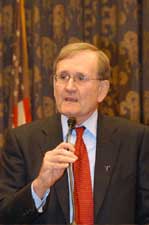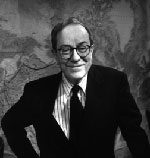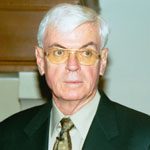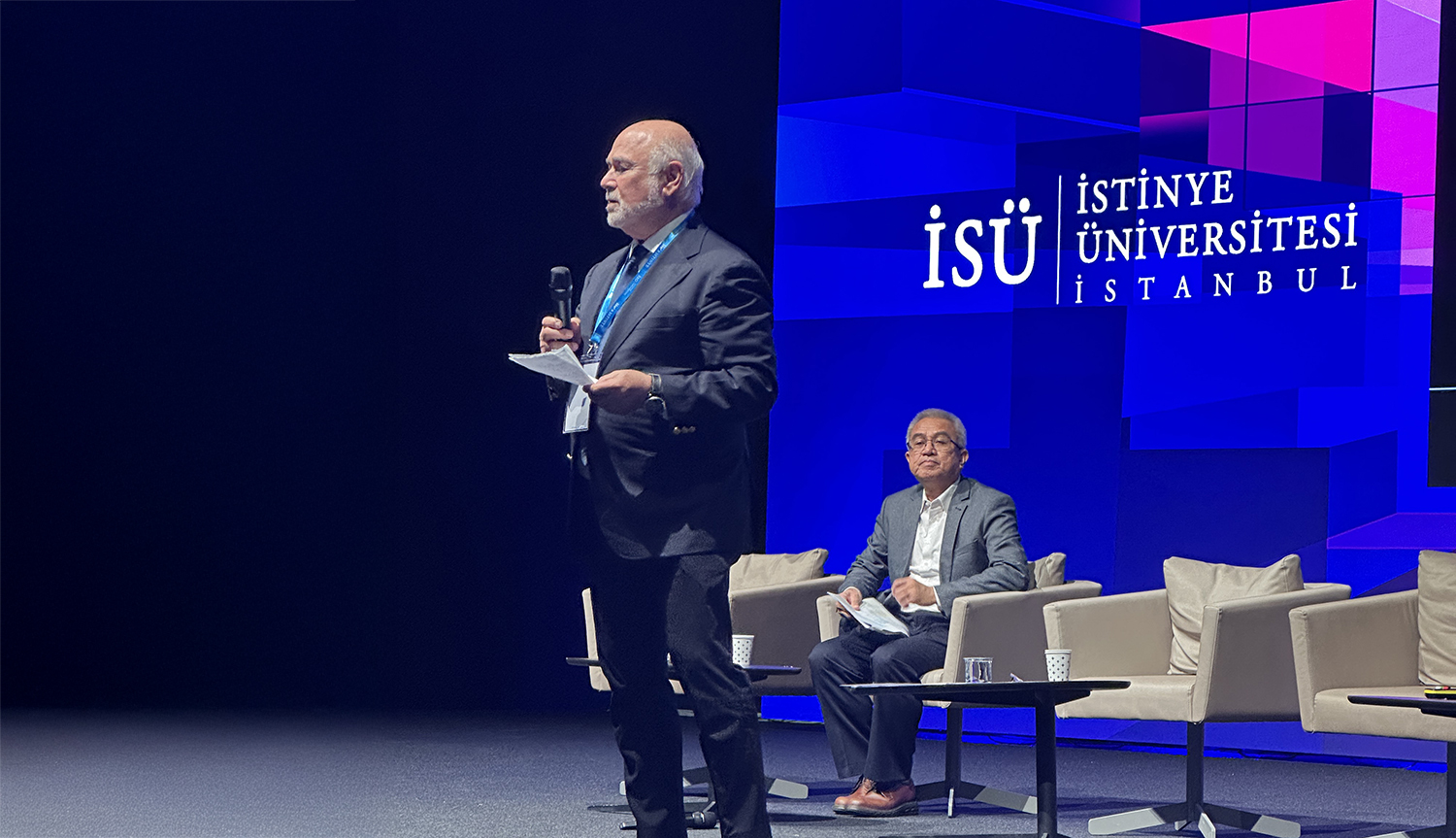Dear Friends and Colleagues,
It is a pleasure to share “A World Free of Nuclear Weapons”, an op-ed by George Shultz, William Perry, Henry Kissinger and Sam Nunn which was published in The Wall Street Journal on January 4, 2007. It is a seminal document in which prominent cabinet secretaries and a former US Senator, Republican and Democratic alike, endorse all that the Bipartisan Security Group (BSG), a program of the Global Security Institute, and other like-minded organizations have been working to achieve for years.
We are very pleased that two distinguished members of BSG, Ambassadors Thomas Graham and James Goodby, played active roles at the Hoover Institute conference where the statement was crafted.
The statement, coupled with a newly-elected Congress, gives us a unique opportunity to press ahead in our efforts to reduce and ultimately eliminate nuclear weapons, and to take concrete steps to fulfill our commitments under the Nuclear Non-Proliferation Treaty (NPT).
 |
Amb. Thomas Graham, Jr. |
We will increase our efforts to work with the Congress to strengthen support for the Comprehensive Test Ban Treaty (CTBT), the negotiation of a Fissile Material Cut-Off Treaty, and advancing efforts for cooperation in space rather than its weaponization.
Current efforts by the Administration to stem proliferation fail precisely because they do not uphold the principle bargain of the NPT – a clear commitment to nuclear disarmament in exchange for nonproliferation. I commend to your specific attention the final two paragraphs of the op-ed. After reminding us of the vision that Presidents Ronald Reagan and Mikhail Gorbachev set forth at Reykjavik and a set of practical steps to achieve that vision, they stated:
Reassertion of the vision of a world free of nuclear weapons and practical measures toward achieving that goal would be, and would be perceived as, a bold initiative consistent with America’s moral heritage.
Hopefully we are now in a position to resume the multilateral approach in international issues which successive American Administrations, Republican and Democratic alike, have followed since the end of World War II.
 |
Ambassador James Goodby |
A “World Free of Nuclear Weapons”, written by individuals so clearly identified with a realisticapproach to international security, reinforces the conclusions of a recent strong statement to similar effect by men and women strongly identified with a morally informed perspective. The Rome Declaration of Nobel Peace Laureates, when read in conjunction with the Wall Street Journal op-ed, highlights this unique historical moment. The most practical and the most moral approaches to international peace and security coincide, thus creating an imperative that we work with redoubled effort to achieve a world free of nuclear weapons:
Nuclear weapons are more of a problem than any problem they seek to solve. In the hands of anyone, the weapons themselves remain an unacceptable, morally reprehensible, impractical and dangerous risk. — Excerpted from the Rome Declaration
We appreciate your support and encourage your engagement as we continue to push for a more rational approach to solving international issues.
 |
Sincerely,
Ambassador Robert Grey, Jr.
Director
Bipartisan Security Group
* * * * * * * * *
A World Free of Nuclear Weapons
By George P. Shultz, William J. Perry, Henry A. Kissinger, and Sam Nunn
The Wall Street Journal
January 4, 2007
Nuclear weapons today present tremendous dangers, but also an historic opportunity. U.S. leadership will be required to take the world to the next stage — to a solid consensus for reversing reliance on nuclear weapons globally as a vital contribution to preventing their proliferation into potentially dangerous hands, and ultimately ending them as a threat to the world.
Nuclear weapons were essential to maintaining international security during the Cold War because they were a means of deterrence. The end of the Cold War made the doctrine of mutual Soviet-American deterrence obsolete. Deterrence continues to be a relevant consideration for many states with regard to threats from other states. But reliance on nuclear weapons for this purpose is becoming increasingly hazardous and decreasingly effective.
North Korea’s recent nuclear test and Iran’s refusal to stop its program to enrich uranium — potentially to weapons grade — highlight the fact that the world is now on the precipice of a new and dangerous nuclear era. Most alarmingly, the likelihood that non-state terrorists will get their hands on nuclear weaponry is increasing. In today’s war waged on world order by terrorists, nuclear weapons are the ultimate means of mass devastation. And non-state terrorist groups with nuclear weapons are conceptually outside the bounds of a deterrent strategy and present difficult new security challenges.
Apart from the terrorist threat, unless urgent new actions are taken, the U.S. soon will be compelled to enter a new nuclear era that will be more precarious, psychologically disorienting, and economically even more costly than was Cold War deterrence. It is far from certain that we can successfully replicate the old Soviet-American “mutually assured destruction” with an increasing number of potential nuclear enemies world-wide without dramatically increasing the risk that nuclear weapons will be used. New nuclear states do not have the benefit of years of step-by-step safeguards put in effect during the Cold War to prevent nuclear accidents, misjudgments or unauthorized launches. The United States and the Soviet Union learned from mistakes that were less than fatal. Both countries were diligent to ensure that no nuclear weapon was used during the Cold War by design or by accident. Will new nuclear nations and the world be as fortunate in the next 50 years as we were during the Cold War?
* * *
Leaders addressed this issue in earlier times. In his “Atoms for Peace” address to the United Nations in 1953, Dwight D. Eisenhower pledged America’s “determination to help solve the fearful atomic dilemma — to devote its entire heart and mind to find the way by which the miraculous inventiveness of man shall not be dedicated to his death, but consecrated to his life.” John F. Kennedy, seeking to break the logjam on nuclear disarmament, said, “The world was not meant to be a prison in which man awaits his execution.”
Rajiv Gandhi, addressing the U.N. General Assembly on June 9, 1988, appealed, “Nuclear war will not mean the death of a hundred million people. Or even a thousand million. It will mean the extinction of four thousand million: the end of life as we know it on our planet earth. We come to the United Nations to seek your support. We seek your support to put a stop to this madness.”
Ronald Reagan called for the abolishment of “all nuclear weapons,” which he considered to be “totally irrational, totally inhumane, good for nothing but killing, possibly destructive of life on earth and civilization.” Mikhail Gorbachev shared this vision, which had also been expressed by previous American presidents.
Although Reagan and Mr. Gorbachev failed at Reykjavik to achieve the goal of an agreement to get rid of all nuclear weapons, they did succeed in turning the arms race on its head. They initiated steps leading to significant reductions in deployed long- and intermediate-range nuclear forces, including the elimination of an entire class of threatening missiles.
What will it take to rekindle the vision shared by Reagan and Mr. Gorbachev? Can a world-wide consensus be forged that defines a series of practical steps leading to major reductions in the nuclear danger? There is an urgent need to address the challenge posed by these two questions.
The Non-Proliferation Treaty (NPT) envisioned the end of all nuclear weapons. It provides (a) that states that did not possess nuclear weapons as of 1967 agree not to obtain them, and (b) that states that do possess them agree to divest themselves of these weapons over time. Every president of both parties since Richard Nixon has reaffirmed these treaty obligations, but non-nuclear weapon states have grown increasingly skeptical of the sincerity of the nuclear powers.
Strong non-proliferation efforts are under way. The Cooperative Threat Reduction program, the Global Threat Reduction Initiative, the Proliferation Security Initiative and the Additional Protocols are innovative approaches that provide powerful new tools for detecting activities that violate the NPT and endanger world security. They deserve full implementation. The negotiations on proliferation of nuclear weapons by North Korea and Iran, involving all the permanent members of the Security Council plus Germany and Japan, are crucially important. They must be energetically pursued.
But by themselves, none of these steps are adequate to the danger. Reagan and General Secretary Gorbachev aspired to accomplish more at their meeting in Reykjavik 20 years ago — the elimination of nuclear weapons altogether. Their vision shocked experts in the doctrine of nuclear deterrence, but galvanized the hopes of people around the world. The leaders of the two countries with the largest arsenals of nuclear weapons discussed the abolition of their most powerful weapons.
* * *
What should be done? Can the promise of the NPT and the possibilities envisioned at Reykjavik be brought to fruition? We believe that a major effort should be launched by the United States to produce a positive answer through concrete stages.
First and foremost is intensive work with leaders of the countries in possession of nuclear weapons to turn the goal of a world without nuclear weapons into a joint enterprise. Such a joint enterprise, by involving changes in the disposition of the states possessing nuclear weapons, would lend additional weight to efforts already under way to avoid the emergence of a nuclear-armed North Korea and Iran.
The program on which agreements should be sought would constitute a series of agreed and urgent steps that would lay the groundwork for a world free of the nuclear threat. Steps would include:
• Changing the Cold War posture of deployed nuclear weapons to increase warning time and thereby reduce the danger of an accidental or unauthorized use of a nuclear weapon.
• Continuing to reduce substantially the size of nuclear forces in all states that possess them.
• Eliminating short-range nuclear weapons designed to be forward-deployed.
• Initiating a bipartisan process with the Senate, including understandings to increase confidence and provide for periodic review, to achieve ratification of the Comprehensive Test Ban Treaty, taking advantage of recent technical advances, and working to secure ratification by other key states.
• Providing the highest possible standards of security for all stocks of weapons, weapons-usable plutonium, and highly enriched uranium everywhere in the world.
• Getting control of the uranium enrichment process, combined with the guarantee that uranium for nuclear power reactors could be obtained at a reasonable price, first from the Nuclear Suppliers Group and then from the International Atomic Energy Agency (IAEA) or other controlled international reserves. It will also be necessary to deal with proliferation issues presented by spent fuel from reactors producing electricity.
• Halting the production of fissile material for weapons globally; phasing out the use of highly enriched uranium in civil commerce and removing weapons-usable uranium from research facilities around the world and rendering the materials safe.
• Redoubling our efforts to resolve regional confrontations and conflicts that give rise to new nuclear powers.
Achieving the goal of a world free of nuclear weapons will also require effective measures to impede or counter any nuclear-related conduct that is potentially threatening to the security of any state or peoples.
Reassertion of the vision of a world free of nuclear weapons and practical measures toward achieving that goal would be, and would be perceived as, a bold initiative consistent with America’s moral heritage. The effort could have a profoundly positive impact on the security of future generations. Without the bold vision, the actions will not be perceived as fair or urgent. Without the actions, the vision will not be perceived as realistic or possible.
We endorse setting the goal of a world free of nuclear weapons and working energetically on the actions required to achieve that goal, beginning with the measures outlined above.
Mr. Shultz, a distinguished fellow at the Hoover Institution at Stanford, was secretary of state from 1982 to 1989. Mr. Perry was secretary of defense from 1994 to 1997. Mr. Kissinger, chairman of Kissinger Associates, was secretary of state from 1973 to 1977. Mr. Nunn is former chairman of the Senate Armed Services Committee.
A conference organized by Mr. Shultz and Sidney D. Drell was held at Hoover to reconsider the vision that Reagan and Mr. Gorbachev brought to Reykjavik. In addition to Messrs. Shultz and Drell, the following participants also endorse the view in this statement: Martin Anderson, Steve Andreasen, Michael Armacost, William Crowe, James Goodby, Thomas Graham Jr., Thomas Henriksen, David Holloway, Max Kampelman, Jack Matlock, John McLaughlin, Don Oberdorfer, Rozanne Ridgway, Henry Rowen, Roald Sagdeev and Abraham Sofaer.
Reprinted from The Wall Street Journal © 2007 Dow Jones & Company.
All rights reserved.
* * * * * * * * *
The Rome Declaration
of Nobel Peace Laureates
We, Nobel Peace Laureates and Laureate Organizations, gathered in Rome, Italy, have for years been deeply disturbed by the lack of public attention and political will at the highest levels of state paid to the need to eliminate nuclear weapons. There are over 27,000 of these devices threatening civilization, with over 95% in the hands of Russia and the US. This danger threatens everyone and thus every person must work to eliminate this risk before it eliminates us.
We oppose the proliferation of nuclear weapons to any state. We are faced each day with a new crisis in proliferation exemplified by concerns regarding North Korea and Iran. However, our focus must be on the weapons themselves for the only sustainable resolution to gain security is the universal elimination of the weapons.
The failure to address the nuclear threat and to strengthen existing treaty obligations to work for nuclear weapons abolition shreds the fabric of cooperative security. A world with nuclear haves and have-nots is fragmented and unstable, a fact underscored by the current threats of proliferation. In such an environment cooperation fails. Thus, nations are unable to address effectively the real threats of poverty, environmental degradation and nuclear catastrophe.
Nuclear weapons are more of a problem than any problem they seek to solve. In the hands of anyone, the weapons themselves remain an unacceptable, morally reprehensible, impractical and dangerous risk.
The use of a nuclear weapon against a state without nuclear weapons is patently immoral. Use against a state with nuclear weapons is also suicidal. These weapons have no value against terrorists or criminals. Progress toward a safer future is not thwarted from a lack of practical, threat-reducing policy options. The problem is a lack of political will.
As Nobel Peace Prize Laureates we commit to work collectively to achieve the elimination of nuclear weapons, which we believe are unworthy of civilization.
We have heard the impassioned warning from the Mayor of Hiroshima and survivors of the atomic bombs and join him and the over 1500 cities around the world, including Rome, in their call to all nations, including those with nuclear weapons arsenals – US, Russia, France, China, UK, Israel, India, and Pakistan – to immediately commence negotiations to obtain the universal, legally verifiable elimination of nuclear weapons. In past years we have set forth practical steps to bring us to such a better world, and we reiterate the need for such policies as a entry into force of the Comprehensive Test Ban Treaty, de alerting of the hair trigger launch on warning arsenals of thousands of hazardous weapons deployed now by Russia and the US, obtain stricter IAEA controls over nuclear materials, and pledges never to use a nuclear weapon first. Such efforts will help to ensure that nuclear capabilities are denied to terrorists.
We issue a serious warning that without such efforts the Nuclear Non-Proliferation Treaty (NPT) could corrode opening the way for dozens of states to become nuclear armed, a frightening prospect. The NPT is a bargain in which nonproliferation is obtained based on a promise by nuclear weapons states to negotiate nuclear weapons elimination and offer peaceful uses of nuclear technology. There is a fundamental dilemma which must end. Nuclear weapons states want to keep their weapons indefinitely and at the same time condemn others who would attempt to acquire them. Such flaunting of disarmament obligations is not sustainable.
The current situation is more dangerous than during the Cold War. We are gravely concerned regarding several current developments such as NPT stakeholders enabling rather than constraining proliferation, modernization of nuclear weapons systems, the aspiration to weaponize space, thus making arms control and disarmament on earth all the more difficult, and the declared policy of terrorist organizations to obtain nuclear weapons.
Given the critical nature of the situation, we pledge to challenge, persuade and inspire Heads of State to fulfill the moral and legal obligation they share with every citizen to free us from this threat. We declare our intention to participate fully in a world summit where leaders of culture, arts, sciences, business, and politics, will actively participate.
As Nobel Peace Laureates, conscience requires us to raise our voices, inspire humankind, and to demand change in state policies. We call upon the citizens of the world to join us in this work.
Participation:
The 7th World Summit of Nobel Peace Laureates took place in Rome from November 17 to 19 and was held, as were previous Summits, on the initiative of Mikhail Gorbachev and the Mayor of Rome, Walter Veltroni.
The ceremony of the acknowledgement of Man of Peace 2006 took place before the opening of the Summit. It was awarded to Peter Gabriel.
The Summit was opened by Walter Veltroni, Lech Walesa and Mairead Corrigan Maguire. Those taking part in the Summit were: Frederik Willem De Klerk, Mairead Corrigan Maguire, Lech Walesa, Carlos Filipe Ximenes Belo, International Atomic Energy Agency, International Physicians for the Prevention of Nuclear War, International Peace Bureau, United Nations Organization, United Nation High Commissioner for Refugees, United Nations Children’s Fund, International Labour Organization, Mèdecins sans Frontières, American Friends Service Committee, Red Cross, International Campaign to Ban Landmines, Pugwash Conference. Guests of honour were: Mayor of Hiroshima and President of the World’s Mayors for Peace Tadatoshi Akiba, Nobel Laureate for Medicine Rita Levi Montalcini, Man of Peace 2006 Peter Gabriel, Representative of the Weapons of Mass Destruction Commission Jayantha Dhanapala, President of the Foundation on Economic Trends and Greenhouse Crisis Foundation Jeremy Rifkin, Under-Secretary-General of the United Nations Nobuaki Tanaka and Under-Secretary-General of the United Nations Jose Antonio Ocampo.
Jonathan Granoff is the President of the Global Security Institute, a representative to United Nations of the World Summits of Nobel Peace Laureates, a former Adjunct Professor of International Law at Widener University School of Law, and Senior Advisor to the Committee on National Security American Bar Association International Law Section.







